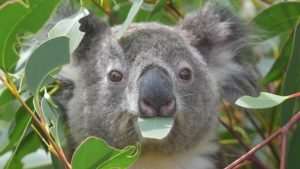Treating koalas for chlamydia alters gut microbes

Koalas are one of Australia's iconic animals, but they have been hard hit by an epidemic of Chlamydia infections contributing to a steep decline in numbers. Sick koalas brought to wildlife hospitals may be treated with antibiotics to clear up the chlamydia, but the antibiotics themselves can have severe side effects in the animals.
A new study led by Katherine Dahlhausen, a graduate student at the UC Davis Genome Center, published in the journal PeerJ, shows that those antibiotics may be changing the balance of gut microbes thought to allow koalas to digest eucalyptus leaves.
Koalas rely on specialized gut microbes to break down tannins and other toxic compounds that would otherwise make eucalyptus leaves indigestible. Infant koalas pick up these microbes from their mothers by eating a specialized type of feces called "pap."
Dahlhausen and colleagues studied the diversity of microbes in koalas treated or not treated with antibiotics at the Australia Zoo Wildlife Hospital, Queensland and the Port Macquarie Koala Hospital, New South Wales. They did not find a difference in gut microbes between treated and untreated animals, but did find that koalas that were treated with antibiotics and survived had a more diverse microbe population than animals that died during treatment.
Health status was closely correlated with presence of bacteria related to Lonepinella koalarum, a microbe known to digest tannins.
There have been other studies showing that antibiotic treatment can disturb gut microbes in other species, Dahlhausen and colleagues noted in the paper. But this might be especially important in animals like koalas where gut microbes are essential to their survival.
The project highlights the possible need to restore a healthy balance of microbes in antibiotic treated koalas and for development of antibiotic-free treatments of koala chlamydia infections, such as as a koala chlamydia vaccine, under development by Peter Timms' lab at the University of the Sunshine Coast, Dahlhausen said.
More information: Katherine E. Dahlhausen et al, Characterization of shifts of koala (Phascolarctos cinereus) intestinal microbial communities associated with antibiotic treatment, PeerJ (2018). DOI: 10.7717/peerj.4452
Journal information: PeerJ
Provided by UC Davis















